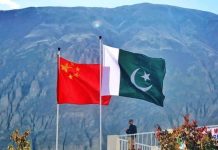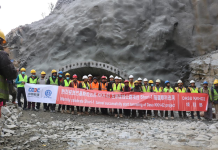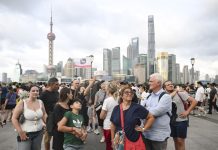BEIJING: In December 2020, a new type of apple, named “the Super Apple,” debuted at supermarkets across China. Before reaching the market, the product had undergone over 500 tests by Geneva-headquartered SGS, a multinational inspection, verification, testing and certification service provider, showing no signs of pesticide residue.
Produced in Luochuan, Shaanxi Province in northwest China, one of the country’s premier apple producing areas, the apples are sweeter than regular ones.
The apple’s quality is ensured via targeted nutrition and other quality improvement plans, which is based on analysis of the apple growing condition, including the health of the soil. Blockchain technology is applied in documenting farmers’ operations so as to avoid nonstandard pesticide use. Digital fruit sorting technology at the apple storage warehouse facilitates the grading of apples to ensure stability in the quality of the apples. All apples taken to market are sweet and juicy.
Sang Yanhai, a 42-year-old apple grower in Luochuan, has seen growing apple yield and increasing income. “I used to feel jealous when I saw imported apples that were labeled with a higher price at supermarkets, but now I believe that apples we grow are equally good,” Sang said.
The key to the apple’s good quality is science and technology. “The future of agriculture lies in modern technology,” Huang Jikun, Director of the China Centre for Agricultural Policy at Peking University, told Beijing Review.At China’s Central Rural Work Conference, held in Beijing from December 28 to 29, 2020, President Xi Jinping stressed that with China at the historical juncture of marching toward its second centenary goal, which is to build a modern socialist country, a number of tasks are currently essential and deserve the full attention of the Communist Party of China (CPC). These are the tasks of consolidating and extending China’s poverty alleviation achievements, advancing comprehensive rural vitalization, and accelerating the modernization of the agricultural sector and rural areas.
Xi said efforts must be made to increase the efficiency and quality of the agricultural sector, make rural areas desirable places to live and work in, and ensure that farmers are well-off. Xi also underlined the importance of speeding up breakthroughs on core and key agricultural technologies.
Song Hongyuan, former head of the Research Center for the Rural Economy at the Ministry of Agriculture and Rural Affairs (MARA), said that China’s agriculture has entered a stage of high-quality development, as the country is meeting the need of an increasing number of more demanding customers for quality agricultural products. However, high-quality produce is currently in shortage, while the supply of basic and bulk agricultural products exceeds demand.
“Accordingly, agriculture should turn to technology,” Song said at a forum on rural vitalization held by Peking University in Beijing in December 2020.
On the southern margin of the Taklimakan Desert in Kashgar Prefecture, Xinjiang Uygur Auto-nomous Region in northwest China, there is a 20-hectare piece of saline-alkali land for growing rice. The land, located close to the farthest point in the world from the ocean, used to be too poor to support vegetation due to its severe salinity.
Three years ago, Yuan Longping, a renowned agronomist, dubbed China’s “father of hybrid rice,” led a trial program of planting rice in saline-alkali soil in areas including Xinjiang and Heilongjiang Province in northeast China. Through genome sequencing technology, scientists in Yuan’s team have been able to nurture improved rice varieties that can grow in saline and alkaline soils like those in Kashgar.
– The Daily Mail-Beijing Review News exchange item






